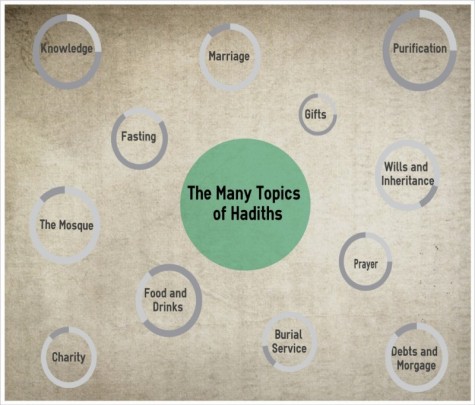Hadiths
Introduction to Hadiths:
The Arabic word Hadith means “talk, conversation” but more specifically refers to the “reported sayings of the Prophet and his Companions” (A Manual of Hadith v). Muslims receive guidance from Hadiths on approaching everyday situations. This reliance is comparable to the Christian faith’s reliance on the book of Proverbs. These records serve as the earliest historical reported information about the Prophet Muhammad and the first Muslims, and represent a source of religious law and moral guidance (A Manual to Hadiths vi). Over thousands of years, Hadiths have served as the foundation of Islamic faith and still serve as a prominent element of Islam.

Arabic Language
by Christopher Rose, used under 
Hadiths began as oral sayings by Muhammad and his prophets. These sayings were passed by word of mouth in their early days. Over the past couple of centuries, Hadiths have evolved into a compilation of thousands of individual narrative briefs (Intro to Hadith ix).This simple form of the word has formed into a compilement of literature that represents an array of Islamic traditions or sayings from the Prophet Muhammad. This compilement of literature discusses numerous topics such as knowledge, intentions, purification, and ethics.
Hadiths about Knowledge:
There are numerous Hadiths about knowledge, but a couple of the most notable Hadiths are listed and explained below.
The Prophet said, “There shall be no envy but two: the person whom Allah has given wealth and the power to spend it in the service of Truth, and the person whom Allah has granted knowledge of things and he judges by it and teaches it to others” (A Manual of Hadith 32).
This Hadith demonstrates the importance of knowledge in Islam by comparing it to envy. The Hadith implies that knowledge is one of the most important characteristics of a person of the Islamic faith. As the Hadith implies, gaining knowledge takes precedence over envy, as the Prophet expresses that envy is acceptable if one envies a person who applies and teaches his knowledge.
“Whomsoever Allah intends to do good, He gives right understanding of religion…Knowledge is maintained only through teaching.” (A Manual of Hadith 38)
The Hadith above explains that knowledge in the Islamic faith does not necessarily refer to knowledge of worldly things, but rather an understanding of religion. In addition, this Hadith explains that just having knowledge is not sufficient. Instead, one must teach others of his knowledge to maintain the gift that Allah gave him. It is important for those given knowledge to teach others, as Allah chose them to be people who would do good.
Hadiths about Purification:

A way to express both outward and inward purification includes foot washing at a mosque.
by Christopher, used under 
Purification is a resemblance of man’s relationship with the Lord. It is believed in the Islamic faith that man should be pure in body and garments so that his soul may also be pure, and a soul of purity leads to purity of the mind. A Hadith about purification is listed below.
“The key to paradise is prayer and the key to prayer is purification (A Manual of Hadith 42).”
This Hadith portrays the general terms that purification is a necessary condition of prayer, which in fact means that a man should always keep himself free from impurities, since prayers are said five times a day. The habit of outward purification is developed through an institution which is meant to purify the soul, and a Muslim is required to keep his body, his clothes, and his whole of environment, clean. Charity, like prayer, purifies the mind. What is acquired by unlawful means is impure, the pure and the impure cannot go together.
Hadiths about Intentions:
Intentions are an important aspect of the Islamic faith because they precede every voluntary action. The rewards received for an action directly parallel the intentions behind an action. A Hadith about intentions is listed below.
“Actions shall be judged only by intention, and a man shall have what he intends; so whoever flies from his home for the sake of Allah and His Messenger, his flight shall be accounted for the sake of Allah and His Messenger, and whoever flies from his home for the sake of worldly gain which he aims to attain or a woman whom he wants to marry, his flight shall be accounted for that which he flies (A Manual of Hadith 3).”
 This Hadith exemplifies the importance of intentions. Although a person’s actions may appear righteous, the inspiration for these actions may stem from impure intentions. If a person’s motivation stems from something worldly, these deeds are not to be rewarded in the afterlife. Mainly, a truly virtuous person’s incentive is to do what is right for the purpose of doing what is right, whereas someone superficially abiding by the Islamic faith may only act a certain way for the outward appearance of being holy.
This Hadith exemplifies the importance of intentions. Although a person’s actions may appear righteous, the inspiration for these actions may stem from impure intentions. If a person’s motivation stems from something worldly, these deeds are not to be rewarded in the afterlife. Mainly, a truly virtuous person’s incentive is to do what is right for the purpose of doing what is right, whereas someone superficially abiding by the Islamic faith may only act a certain way for the outward appearance of being holy.
The Importance of Hadiths:
Hadiths have been, and will continue to be, critical to the Islam faith. Hadiths serve as guidelines for various topics, which range from marriage to purification and knowledge to ethics. These sayings from the Prophet Muhammed and his companions serve as one of the fundamental sources of information regarding the actions and thoughts of an honorable Muslim.
Written By: Kristen Brady, Madison Horth, and Allison Morrill
Last Updated: December 10, 2013
Works Cited:
Ali, Muhammad. A Manual of Hadith. New York: Olive Branch, 1988. Print.
Burton, John. An Introduction to the Hadith. Edinburgh: Edinburgh UP, 1994. Print.
